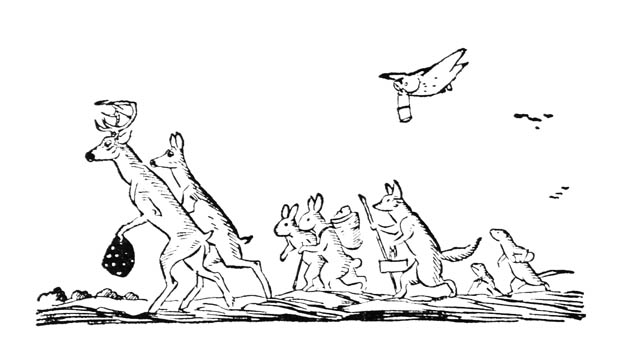

CHAPTER XI
THE TRIAL
At last came the day of the trial. From early morning the roads and field paths were full of animals, streaming toward the cowbarn, where Jinx was to be tried for the murder and subsequent eating of the crow. Many of them had brought their lunch with them, for there was no question that the trial would be a long and hard-fought legal battle. The general opinion through the countryside was that the cat was guilty, but Jinx’s friends had stuck by him loyally, even in face of what seemed almost certain guilt. “For,” said they, “we stand on Jinx’s past record, as well as on the general nature of cats. Jinx has never been known to chase, much less to eat, even a sparrow. And it is a well-known fact that no cat will eat a crow. We don’t care what the rats say. We believe him innocent.”
The trial was set for two o’clock. From the door of his office Freddy, in the intervals of his work, could see the animals streaming by. But he was very busy that morning. The capture of the robbers had made a great impression, and accounts of it had been published in every paper in the country. The day before, a deputation of Centerboro citizens, headed by the mayor in a silk hat, had come to tender him their official thanks and to pay him the reward of five thousand dollars. After the ceremony, which included speeches by several prominent bankers and business men, a number of the deputation had stayed behind to engage his services in various matters which they wanted cleared up. Many animals, too, from distant villages, who had now heard for the first time of his remarkable ability as a detective, had brought him their troubles, so that he had work enough to keep him busy for a year or more. He listened to them all with courteous attention, giving as much of his time and interest to the cousin of Henrietta’s from whom a china egg had been stolen as to the wealthy banker from Green’s Corners who wanted assistance in finding his long-lost daughter.
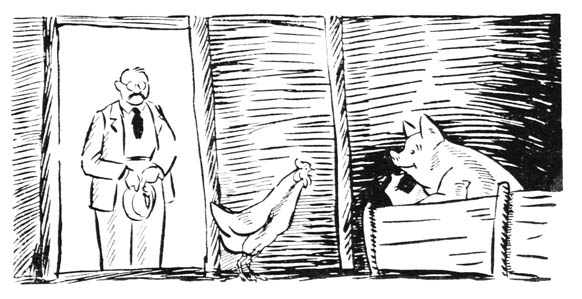
He sat inside the shed, listening gravely to his clients, exchanging now and then a word with his partner, Mrs. Wiggins—who had to sit outside the door because there was not room for her inside—giving orders to his subordinates, the mice and squirrels and other small animals to whom were given the less important tasks of detecting, and receiving the reports of other birds and animals who hurried in and out on his errands. Beside him the money he had received as a reward was piled up in plain sight—“for no one,” said Freddy, “would dare to steal it now. They know that if they tried it, we’d catch ’em and have ’em clapped in jail within twenty-four hours.”
Pretty soon Jinx himself came along. He sat down and waited until Freddy had finished with another client, then went in and said good morning.
“Good morning, Jinx,” said Freddy. “How’s everything up at the house?”
“Oh, all right, I guess,” replied the cat. “But I tell you, Freddy, I’m a little nervous, and that’s a fact. Are you sure you can get me off? As I told you, I wouldn’t mind so much going to jail at any other time, but right now it’s as much as my job’s worth not to be where I can keep those rats in their place.”
“I thought you’d got the upper hand of them since the other night,” said Freddy.
“So I have. I captured Ezra and two of Simon’s nephews and locked them up; and where those boards were ripped up, I found nearly a bushel of grain, which the mice carried back to the grain-box while I stood guard, but Simon is still there, and this morning, while Mr. Bean was getting the boards ready to be put back in place and nailed down, Simon stuck his head out of his hole and gave me the laugh. ‘You’ll never drive us out of the barn, Jinx,’ he said. ‘I admit you got most of our supplies, but by this time tomorrow night,’ he said, ‘you’ll be locked up safe and tight, and then, boy! Won’t we have a feast! And by the time you get out,’ he said, ‘we’ll have enough more stored away so you’ll never get us out.’”
“Well, as I’ve told you before,” said Freddy, “you aren’t going to be locked up. I’ve got this case just where I want it, and the trial will prove some things about those rats that will surprise you. It isn’t just what I believe—it’s what I can prove. And I can prove you didn’t kill any crow.”
“Well,” said the cat, “I wish you’d tell me—”
“No,” interrupted the pig, “I’m not going to tell you anything. It’s a long story and you’ll hear it all in court. There isn’t time for it now. Just be patient, and don’t worry, and everything’ll come out all right, I promise you.”
“I hope you’re right,” said Jinx with a sigh. “Oh, gosh!” he exclaimed suddenly, glancing out of the door, “here’s Charles. I’m off, Freddy. I’ll lose my temper if I talk to that big stuffed shirt, and goodness only knows what might happen then.”
“Yes, you’d better go along,” said Freddy. “See you in court.—Morning, Charles, how’s everything in the hen-house this morning?” he said as the rooster, with an indignant glance at the departing cat, entered the office.
“Everything is all right, thank you,” said Charles stiffly. “I must say, Freddy, I can’t approve of your hob-nobbing with criminals this way.”
“Oh, hob-nobbing with your grandmother’s tail-feathers!” exclaimed the pig good-naturedly. “Don’t try that high and mighty stuff with me, that’s known you since you were a little woolly chicken that couldn’t say anything but ‘Peep, peep,’ like a treetoad!”
“That’s all very well, Freddy,” said the rooster, “but, fond as I have been of Jinx in the past, it is my belief that by committing this crime he has forfeited the friendship and esteem of all decent animals, and I cannot—”
“Oh, save the speech till later in the day,” interrupted Freddy. “But just let me tell you this: Jinx is innocent, and I can prove it, and I’m going to prove it this afternoon, and you’re going to feel very silly when you know the truth and remember all the things you’ve said about him. And now let’s talk of something else. I’ve been wanting to see you to ask you what you thought about conditions in the jail. It isn’t as overcrowded as it was before we threw out all the animals who hadn’t been sentenced at all, but it seems to me that we could make it a little less like a club if you pardoned any animals who seemed to be having too good a time there, and put them out. I think that if the animals knew that they weren’t going to be allowed just to stay there and enjoy themselves, they wouldn’t be so anxious to get in, and there wouldn’t be so many of them stealing things just so they’d be put there.”
“An excellent idea, Freddy,” said the judge. “And I’d like to start with that Eric. You know what he’s done? He’s been making speeches to the other prisoners, telling them how silly they are to want to stay out of jail when they can have so much better fun inside, and he’s organized a lot of them into a club called the Hoho Club. To join it you have to give your word that as soon as your sentence is up and you’re free again, you will commit some crime so you’ll be put right back in.”
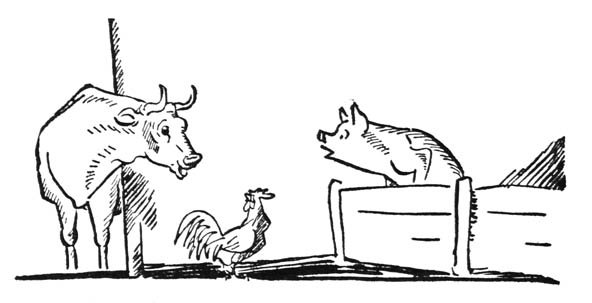
“What does ‘Hoho’ mean?” asked Mrs. Wiggins.
“Hilarious Order of Habitual Offenders,” said Charles.
“Which leaves me right where I was before,” said Mrs. Wiggins. “What does that mean?”
“An habitual offender,” explained Freddy, “is an animal who makes a habit of committing offenses, so he’ll go to jail.”
“Oh!” said Mrs. Wiggins.
“They’ve even got a song they sing,” said Charles angrily. “It goes something like this:
Habitually we offend
Against our country’s laws.
It works out better in the end
Than being good, because—
No home has a superior
Or cheerier interior
Than this old jail,
The which we hail
With constant loud applause,
For—
Be it ever so crowded
There’s no—o place like jail!”
“It’s not a very good song,” said Freddy. “Or perhaps it’s the way you sing it.”
“Not enough expression,” put in Mrs. Wiggins.
“Oh, who asked you to criticize my singing?” asked Charles crossly. “I was just telling you—”
“Sure, sure,” said Freddy soothingly, “we agree with you. Something’s got to be done. But wait till after the trial this afternoon. I’ve got an idea how we can fix this Hoho Club so they won’t be so anxious to come up before the judge. I’ll see you then, Charles.”
“Everything is in now except Eeny’s report, isn’t it?” asked Mrs. Wiggins, as soon as Charles had gone.
“Yes,” said Freddy, “and he’ll meet me at the court-room. I suppose we’d better be getting on over and see that all our witnesses are there. Here’s the evidence.” He dragged out a market basket in which were the claws and feathers that had been found in the loft, along with several other small objects, and Mrs. Wiggins hooked it up with her horn and they started off.
The cow-barn was full, and a big mob of animals who could not find room inside were crowded about the door. Mrs. Wiggins pushed her way good-naturedly through the crowd, and Freddy followed. “What you got in the basket?” called a horse. “You going to use it to carry out what’s left of Jinx after the trial?”
The crowd laughed, and Freddy turned around. “Listen, horse,” he said, “we’ve got the proofs of Jinx’s innocence in this basket, and what do you say to that?”
“Why, I say I hope it’s true,” replied the horse, and the other animals raised a cheer.
At the far end of the barn was an old phaeton, which the animals had brought back from Florida two years before, and on the front seat stood Charles, very dignified and grand, only occasionally exchanging a few words in an undertone with Peter, the bear, who was foreman of the jury. Charles had selected the twelve members of the jury, and they sat in a double row to the left of the phaeton: Peter and Mrs. Wogus and Hank and Bill, the goat, and two sheep in the back row, and in the front row, because they were smaller, Cecil, the porcupine, and Emma’s Uncle Wesley, and two mice, Quik and Eek, and Freddy’s sister’s husband, Archie, who was so fat that he snored, even when he was wide awake. The twelfth juryman, Mr. Webb, the spider, had spun a thread down from the roof and hung there, just above the rest of the jury, where he could see and hear everything, but wouldn’t be in danger of being stepped on. In the back seat of the phaeton was the prisoner, Jinx, looking much worried.
Every available inch of space in the barn was occupied. Window-sills, beams, and rafters were lined with field mice, chipmunks, squirrels, and birds, and the pressure of the crowd on the floor was so great that even before the trial began, several smaller animals fainted and had to be carried out. Just in front of the judge a space had been kept clear, and as Freddy moved up to one side of this, Eeny darted out from under the phaeton.
“I found it at last, Freddy,” he said. “They didn’t get it from Mr. Bean’s house at all. It was Miss McMinnickle’s. Something Prinny said put me on to it, and I went down there and got in the house, and, sure enough, they’d tipped it over on her writing-desk and spilled a lot, and you could see their footprints on the blotter.”
“Fine!” said Freddy. “That’s great work, Eeny!”
“I brought a piece of the blotting-paper along,” said the mouse. “Jock has it for safe keeping.”
“Good. Now stick round. I’ll need your testimony before very long. Believe me, we’re going to give those rats a surprise!”
“Order in the court!” called Charles in his most important voice. “Silence, please. Now, gentlemen of the jury—”
“Ladies, too,” whispered Jock, pointing toward Mrs. Wogus.
“You can’t say ‘ladies’ when there’s only one,” snapped Charles.
“Well, you’ve got to say something, you can’t just leave her out entirely.”
“Lady and gentlemen of the jury,” said Charles, “you are here to decide from the evidence presented to you at this time upon the guilt or innocence of one, Jinx, a cat in the employ of Mr. Bean, who is charged with the murder, and subsequent eating, of an unknown crow, in the barn on August 7 last. Ferdinand, as a member of the great crow family, will conduct the prosecution. Frederick, the well-known detective, will conduct the defense, with the assistance of his colleague, Mrs. Wiggins. Mr. Ferdinand, will you call your witnesses?”
Ferdinand hopped up to the dash-board of the buggy, cleared his throat with a harsh caw, fixed the foreman of the jury with his sardonic eye, and said:
“As you doubtless know, ladies and gentlemen, the chief witnesses for the prosecution are Simon and his family, a band of rats who are living illegally, and without permission from Mr. Bean, in the barn. This in itself constitutes a misdemeanor which may well in time bring them as prisoners into this court. Nevertheless, their crimes and offenses have nothing to do with the case which we are now considering, and I wish you, in listening to their evidence, to make up your opinion without reference to any prejudice you may have against them on that score. It is Jinx who is being tried now, not the rats. Do I make myself clear?”
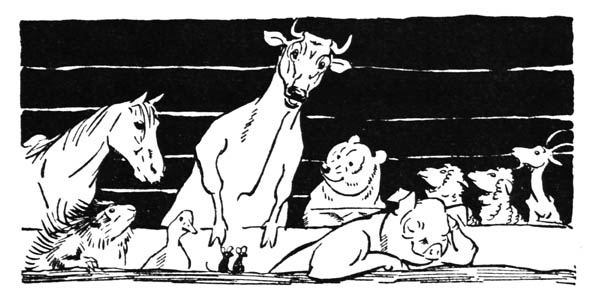
Mrs. Wogus spoke up. “No,” she said bluntly, “you don’t.”
“I will try to make myself more clear,” said the crow. “You believe these rats are thieves, don’t you?”
“Yes,” said the cow, “I certainly do.”
“Probably a good many of us here agree with you,” said Ferdinand. “Still, they have a story to tell of what they saw, and in judging of the truth of that story you must not be influenced by that belief. In other words, just because you think they are thieves, you mustn’t also think they are liars.”
“But I do,” said Mrs. Wogus. “How can I help it?”
“Because it hasn’t anything to do with this case,” said Charles.
“Certainly it has,” said the cow.
“You’d better get on with your case,” said Charles to Ferdinand, and the crow, seeing that he was only throwing doubts on the truthfulness of his witnesses by continuing his efforts to explain, nodded his head.
“Well,” he said, “I can only ask you to judge by the evidence that will be presented to you. I may say that the rats were reluctant to come here and testify, since it meant leaving their homes under the barn, where they feel themselves safe. In order to get them here at all I have had to get a promise from the judge that they shall not be molested until the trial is over. I will now call my first witness, Simon.”
The old gray rat crept out from under the buggy, where he and his family had been waiting, and took his place in the open space reserved for witnesses.
“Tell the jury in your own words what you saw,” said Ferdinand.
Simon’s whiskers twitched and his eyes slid round toward Jinx, who was crouched in the back seat of the buggy, his tail moving gently from side to side. “I’d like to have your word, your honor,” he said to Charles, “that my children and I will be allowed to give our evidence and go back home without being assaulted. I’m a poor rat, and I ain’t done harm to anybody. We rats have to live. That’s something that you animals don’t ever seem to think of—”
“Silence!” said Charles sternly. “We’re not trying your case now.”
“No, sir,” said Simon humbly. “But if you’d just give your word—”
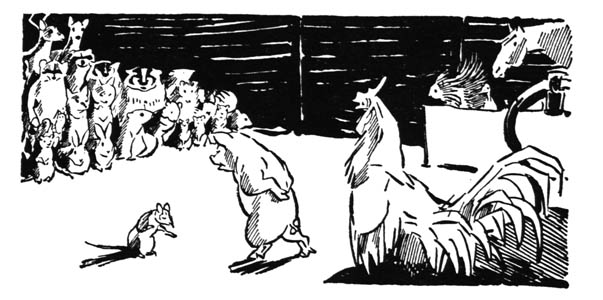
“The judge and the jury and all the animals, including myself and the prisoner,” put in Freddy, “have agreed that until the trial is over, no harm shall come to you. Am I right, Your Honor?”
“That was the agreement,” said Charles.
“Yes,” said Simon, “but will you give me safe conduct back to the barn after the trial?”
Charles was about to speak, but Freddy interrupted him. “Unless you commit some crime between now and the time the trial is over,” he said, “you’ll be allowed to go back with your family.”
This seemed to satisfy Simon, who, with an uneasy eye on Jinx, began to tell his story.
“At noon on August 7, I and my family were peacefully eating our dinner when we heard a great commotion in the loft. We rushed up through our secret passageways in the walls and, looking out from our holes, saw one of the most terrible sights we have ever witnessed. This cat, who now stands before the bar of justice—this wicked felon, whose vile sins have at last found him out—this evil—”
“Come, come, Simon,” interrupted Freddy, “get on with your story, and don’t call names.”
“Ah, forgive me, Your Honor,” said Simon, with a hypocritical leer at Charles, “for letting my feelings get the best of me. It is my hatred and loathing for such detestable crimes that has led me into saying more than I intended—”
“And if you say much more like that,” put in Jinx with an angry swish of his tail, “there’ll be a real murder to investigate in about two seconds. One good overhand swipe at you, you oily old rodent, and there’ll be one less at breakfast tomorrow morning under the barn!”
“Order!” shouted Charles. “Continue with your story, rat, and keep your opinions to yourself.”
“Yes, Your Honor,” said Simon with mock humility. “As I was saying, this—this cat had pounced upon a poor, inoffensive little crow and, when we had reached a point from which we could see what was going on, was tearing him limb from limb with unparalleled ferocity. We shouted, Your Honor; we called upon him to stop; but he merely grinned wildly and went on with his butchery. I sent one of my grandchildren to notify the police at once, but then there was nothing for us to do but watch until the horrid deed was done. We wept, Your Honor—I will not conceal it from you that in our horror and indignation, in our helplessness and in our sorrow for the fate of this wretched bird, we wept bitter tears. But they were as unavailing as our threats and warnings. The cruel and relentless animal was—” Simon stopped suddenly as Jinx leaped to his feet. “That, Your Honor,” he said hastily, “is my story.”
Following Simon came eight other rats who testified to having seen the same thing; then Charles took the stand and told of having been summoned to the barn, where he found Jinx, evidently terrified at having been discovered in his crime. Then, Freddy having said that he would like to cross-examine Simon, the rat again came forward.
“How large are the rat-holes that lead into the loft?” asked the pig.
“You’ve seen ’em; you ought to know,” replied the rat with a grin.
“That’s not what I asked you,” snapped Freddy. “Are they big enough for a cat to get through?”
“No cat ever got through ’em.”
“Just about big enough for one rat, then?”
“Just about.”
“And how many are there?”
“Three,” said Simon. “There ain’t any harm in my telling you that.”
“Oh, isn’t there?” said Freddy. “Well, will you tell me how nine rats, with only three holes big enough for one rat each, managed to see everything that went on?”
Simon snarled and twitched his whiskers. “Trying to make me out a liar, are you?” he demanded. “Well, let me tell you, smarty, that three rats can see out of one rat-hole all right.”
“How do they stand when they’re looking out?” asked Freddy. “They can’t stand beside each other, and if they stand one behind the other, how can they see?”
“How do I know how they do it!” snarled Simon. “They did it all right, didn’t they? You heard ’em say they saw it, didn’t you?”
“Sure, I heard ’em,” said Freddy pleasantly, and, turning to Charles: “That’s all, Your Honor,” he said.
Simon retreated under the buggy, where a chatter and squeaking of excited rat voices could be heard, while the jury examined the claws and feathers of the crow. Evidently Freddy’s questions had disturbed the witnesses somewhat, but they quieted down when Freddy announced that if the prosecution had no other evidence to present, he would like to call a few witnesses in the defense.
The first was Ferdinand himself, who testified that he did not know who the dead crow could be. So far as he knew, no crows had been reported missing within a day’s flight in any direction from the farm.
“At this time of year crows are not likely to fly more than a day’s flight in any direction, are they?” asked Freddy.
“No,” said Ferdinand. “But this crow might have been going on a visit to relatives in another district. It is probable that this was the case.”
“Crows don’t usually make such visits, do they?”
“No.”
“Have you ever known of a crow doing it?”
“No,” said Ferdinand, “but that’s no reason why one might not do it.”
“True,” said Freddy, “but I would say that it is possible, rather than probable, wouldn’t you?”
“Why, yes, perhaps,” said Ferdinand unwillingly.
“Thank you, that’s all,” said Freddy. “I will now call Eeny.”
The mouse took the stand and told how he had been sent by Freddy to inspect the writing-desks of all the neighbors within half a mile of the farm. At none of them had he found anything unusual or out of the way until he had visited Miss McMinnickle’s house. Here he had found signs that the ink-bottle had recently been overturned, and although Miss McMinnickle had evidently sopped up the ink and washed and cleaned the desk, the blotter on which the bottle had been standing showed several large blots, and the inky prints of many small feet. He had brought away with him a piece of this blotter, which Freddy presented to the jury for their inspection.
Freddy then called Prinny, Miss McMinnickle’s dog, who testified that on August 5 Miss McMinnickle had had chicken for supper. Charles shuddered at this, and his daughter Leah, who was perched on a beam over the jury-box, fainted dead away and fell with a thump to the floor. When she had been carried outside and order had been restored, Freddy said:
“When did you last see the claws of this chicken?”
“I object!” exclaimed Ferdinand, before Prinny could answer. “Your Honor, the question of what this Miss McMinnickle had for supper on the day before this brutal murder has nothing to do—”
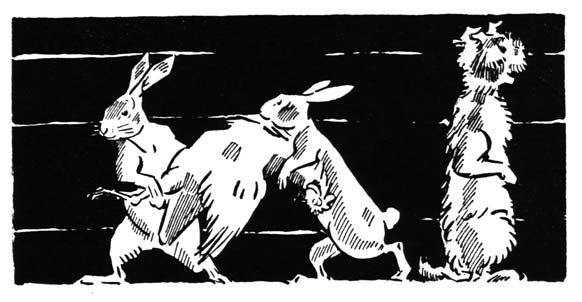
“And I object, Your Honor,” shouted Freddy suddenly. “It is not yet proved that any murder has been committed, and I submit that Ferdinand is endeavoring to prejudice the jury.”
“Order in the court!” crowed Charles, as the animals surged closer so as not to miss a word of this clash between the opposing counsel. “You can’t both object at the same time! What did you object to, Ferdinand?”
The crow repeated his remark.
“I intend to show, Your Honor,” said Freddy, “that the question of what this lady had for supper has a very close bearing on the case. May I proceed?”
“Proceed,” said the judge, who was somewhat flustered and couldn’t think of anything else to say.
Freddy repeated his question, and Prinny said: “I last saw them on the rubbish heap on the morning of August 6.”
“And did you visit the rubbish pile later on the same day?”
“I did.”
“And they were there?”
“No,” said Prinny, “they had disappeared.”
Ferdinand did not cross-examine this witness, and Freddy then called Simon’s son Zeke. There was a flutter of interest as Zeke took the stand, and the animals pushed forward until Charles threatened to have the court-room cleared unless they were quiet. Even Archie opened his little eyes, which had been tight shut for some time, and stopped snoring.
“Now, Zeke,” said Freddy, “I suppose you are anxious to answer all the questions I ask you fully and truthfully?”
“Oh yes, sir,” said Zeke, opening his eyes wide and trying to look truthful, but only succeeding in looking as if he had a stomachache.
“Very well,” said Freddy. He paused a moment, then suddenly he glared at the rat. “Where were you on the morning of August 6?” he shouted.
Zeke looked startled. “Why, sir, I—I was at—home all day. Yes, sir, at home.”
“You were, eh?” roared Freddy. “And what if I tell you that I have witnesses to prove that you were not home?”
“Why, I might have been out for a little while, sir. I can’t exactly remember. I do go out once in a while.”
“You were out, then?”
“Yes, sir. I—I may have been.”
“Good,” said Freddy. “Now cast your mind back to the morning of August 6. You were out taking a walk, let us say. You went up along the side of the road to Miss McMinnickle’s house. Am I right so far?”
“Why, honestly, sir, I can’t remember. I was just out getting a little air. I might have gone up that way. I—”
“You might have gone that way?” said Freddy. “I suggest that you went directly to Miss McMinnickle’s house, to which you gained entrance through a cellar window. You then went upstairs and got up on the kitchen table and ate part of a ham—”
“Oh no, sir!” exclaimed the rat. “I wasn’t in the kitchen at all. I—”
“Shut up, you fool!” came Simon’s snarling voice from under the buggy, and immediately Ferdinand began fluttering his wings and shouting: “Stop! Stop! I object! Your Honor, I object on two counts. First, Zeke’s whereabouts on the day before the mur—I should say, the alleged crime—have nothing to do with this case. Second, Freddy is trying to intimidate this witness.”
“Objections not sustained,” snapped Charles. “Even if this rat’s whereabouts have nothing to do with the case, I guess everybody here wants to know what he was doing at Miss McMinnickle’s. And, second, if anything can be done by Freddy or any other animal to intimidate him, I want to see it done. Proceed, Freddy.”
“Oh, shucks!” exclaimed Ferdinand disgustedly. “That isn’t any way to try a case, Charles. Use a little sense, will you?”
“If you don’t like the way this case is being tried, crow,” said Charles with dignity, “you are at liberty to leave. This court will not be dictated to. I’m here to sentence Jinx, and sentence him I will, but I shall do it in my own way.”
“Perfectly satisfactory to me, Your Honor,” said Ferdinand.
“But it’s not to me,” said Freddy. “You are not here to sentence Jinx, Charles; you’re here to see that justice is done.”
“Well, justice is done if I sentence him, isn’t it?” demanded the rooster.
“Not if he’s innocent.”
“But he isn’t innocent,” exclaimed Charles. “Everybody knows that.”
“No free-born American animal,” said Freddy, “can be convicted of a crime until he is proved guilty. I appeal to the audience in this court-room. What should we do with a judge who condemns a prisoner before he has stood trial?”
“Depose him! Throw him out! Elect another judge!” shouted the animals.
“Order in the court!” screamed Charles. “My duty here is to give judgment—”
“You can’t give what you haven’t got!” called a voice. “You never had any judgment, Charles, and you know it!”
There was a shout of laughter, but Freddy stood up on his hind legs and motioned for silence, and the noise quieted down.
“I’m sure,” he said, “that our worthy judge spoke without thinking. He knows as well as you do that a prisoner is considered innocent until he is proved guilty. I merely wished to call attention to the fact that he is letting his dislike of Jinx interfere with his sense of justice. You see that, don’t you, Charles?”
“Oh, I suppose so,” replied the harassed rooster. “Get on with your trial, will you, and quit picking on me.”
“Very well,” said Freddy. “Now, Zeke, by your own admission, you were in Miss McMinnickle’s house on the morning of the 6th. Will you tell us what you did there?”
“You don’t have to answer that,” called Simon from under the buggy. “You don’t have to answer any question if you feel that the answer would tend to incriminate or degrade you.”
“All right, I won’t answer that,” said Zeke.
“You feel that the answer would incriminate or degrade you?” asked Freddy.
“Yes. A lot.”
“Good,” said Freddy. “Consider yourself incriminated and degraded, then. Ferdinand, do you wish to cross-examine this degraded witness?”
“No,” said Ferdinand crossly. “He hasn’t anything to do with this case. I’ve said that all along.”
So Freddy called two more witnesses. The first, a squirrel, testified to having seen a rat carrying a bird’s claw of some kind going toward the barn on the morning of the 6th. The second, a blue jay, testified that on the same day he had come home to his nest unexpectedly and had found two rats looking into it. He had flown at them and driven them away and had then looked about carefully, but could find nothing missing except a number of long feathers which had formed part of the lining of the nest. Later in the day he had seen two rats, who might or might not have been the same two, running through the woods carrying in their mouths a number of feathers of different kinds. They had evidently been gathering them for some purpose of their own.
The crowd, which could not see what all this had to do with the case and had been getting restless, became quiet again when Freddy announced that he would call no more witnesses, but would sum up his case for the jury.